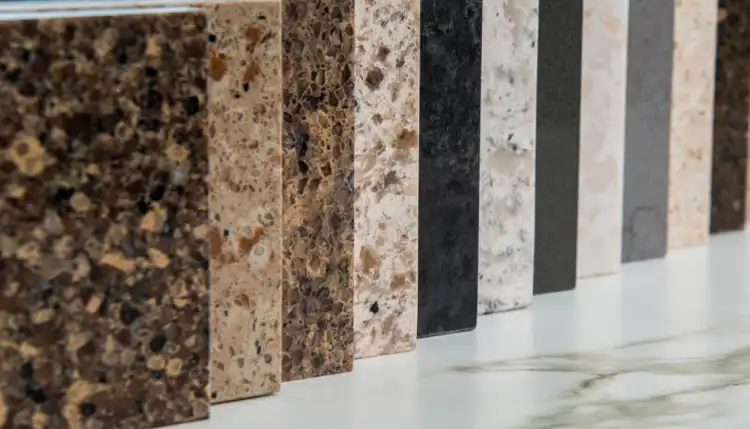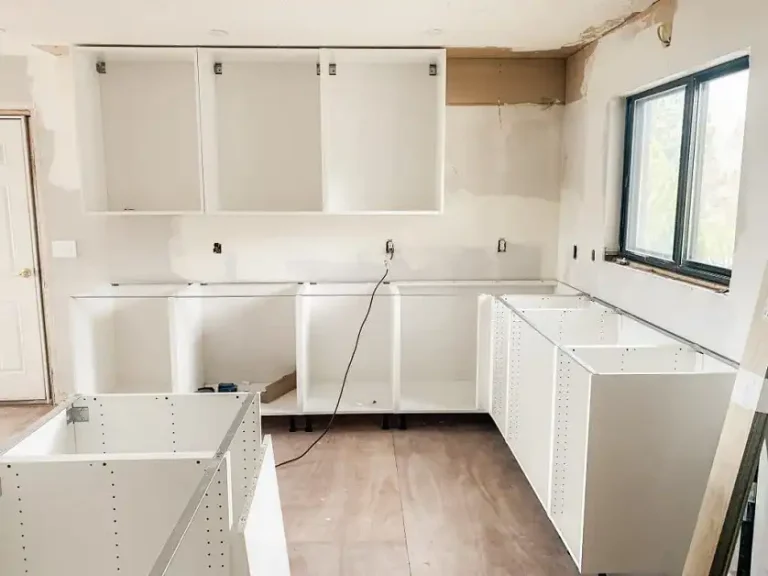How Thick Should a Countertop Slab Be?
Countertops are a major design element in your kitchen and bathroom, playing a crucial role in both aesthetics and functionality. But beyond style and color, there’s another important decision to make: thickness. The right thickness can elevate your space, enhance durability, and impact the overall feel. So, how thick should your countertops be?
Well, it depends a lot on the type of the countertop material. While a granite countertop can be 2-4 cm thick, laminate countertops can be slightly thinner.
Below, we’ll explore the factors that influence countertop thickness, the benefits of different thickness options, and practical tips to help you make an informed decision.

Standard Countertop Thicknesses by Material

The ideal thickness depends on the material you choose. Here’s a breakdown of the most common countertop materials and their standard thicknesses:
1. Granite Countertops
Industry Standard: 1.25 inches (3 cm) – This thickness is widely regarded as the ideal choice for granite countertops, offering optimal strength and stability. According to industry experts at Academy Marble, a 3 cm thickness eliminates the need for plywood backing and allows for overhangs up to 16 inches without additional support.
Thinner Option: 1 inch (2 cm) – While less common, a 2 cm thickness can be suitable for bathroom vanities or projects where cost-effectiveness is a priority. However, it’s important to note that this thinner option may require additional support for overhangs.
Thicker Option: 4 cm – For applications that require extra support, such as large overhangs or bars with seating, a thicker 4 cm slab may be recommended to ensure structural integrity.
2. Quartz Countertops
Standard Thickness: 1.25 inches (3 cm) – Similar to granite, a 3 cm thickness is the industry standard for quartz countertops, providing durability and a high-end look.
Less Common Option: 3/4 inch (2 cm) – While not as widely available, some manufacturers offer a thinner 2 cm quartz option for specific applications where a sleeker look is desired.
3. Laminate Countertops
Standard Range: 3/4 inch to 1.5 inches – The thickness of laminate countertops can vary depending on the core material used. Generally, thicker cores provide better stability and support.
Thicker vs. Thinner Countertops: Pros and Cons
Now that you know the standard options, let’s explore the advantages and disadvantages of each thickness:
Thicker Countertops (1.25 inches and above)
| Pros | Cons |
| Increased Durability: Resists cracks, chips, and breakage better, especially important in high-traffic kitchens. | Higher Cost: More material translates to a higher price tag. |
| Enhanced Stability: Provides a more solid feel and can support heavy appliances without flexing. | Installation Considerations: May require additional support for extensive overhangs due to the weight. |
| Luxurious Appearance: Creates a high-end, impressive visual statement, particularly noticeable in kitchens. | |
| More Design Options: Allows for a wider variety of edge profiles (bullnose, ogee) and design elements like deeper undermount sinks. |
Thinner Countertops (¾ inch to 1 inch)
| Pros | Cons |
| Lower Cost: A budget-friendly option, especially for larger countertop areas. | Reduced Durability: More susceptible to chips and cracks, especially on edges. |
| Easier Installation: Lighter weight simplifies handling and installation. | Limited Stability: May require additional reinforcement for undermount sinks or heavy appliances. |
| Space Optimization: Can be beneficial in tight spaces where every inch counts. | Fewer Design Options: Limited to simpler edge profiles due to the thinner material. |
| Modern Aesthetic: Creates a sleek, contemporary look that complements modern kitchens. |
How to Choose the Right Countertop Thickness
Here are some actionable tips to help you decide on the ideal countertop thickness:
Consider Material and Use: Granite’s strength allows for a thinner option (1 inch) in some cases, while quartz typically benefits from the standard 1.25 inches for optimal durability.
Think About Functionality: Opt for a thicker countertop (1.25 inches or above) for high-use kitchens with heavy appliances. Bathroom vanities can handle a thinner option (1 inch) if budget is a concern.
Visualize the Look: Thicker slabs create a more substantial and luxurious feel, while thinner options offer a sleek, modern aesthetic. Choose what complements your overall design vision.
Budget: Be realistic about your budget. Thicker countertops cost more due to the additional material.
End Notes
Choosing the right countertop thickness is a critical decision that should balance functionality, aesthetics, and cost considerations. By understanding the factors that influence thickness requirements, the benefits of various options, and the potential implications, you can make an informed choice that suits your specific needs and preferences. Remember, consulting with countertop professionals can provide invaluable guidance and ensure a successful installation that meets your expectations.
FAQ
Can I cut a thicker slab to a thinner size?
While it is technically possible to cut a thicker slab to a thinner size, this process can be challenging and may compromise the integrity of the material. It’s generally not recommended, as it can lead to uneven surfaces, increased risk of cracking, and potential voiding of warranties. If you require a thinner countertop, it’s best to purchase the desired thickness from the manufacturer.
Is there a standard thickness for backsplashes?
The standard thickness for backsplashes can vary depending on the material used. Typically, backsplashes made from the same material as the countertop will match the countertop thickness. However, for tile or other materials, the thickness can range from 1/4 inch to 1 inch, with 3/8 inch being a common choice for tiles.
How does countertop thickness affect countertop overhang?
The thickness of your countertop directly impacts the maximum overhang length that can be supported without additional reinforcement. Thicker slabs can generally accommodate longer overhangs, while thinner countertops may require support systems like corbels or brackets for overhangs beyond a certain length. Consulting with a professional is recommended to determine the appropriate overhang length based on your countertop’s thickness and material.
What is the minimum recommended thickness for a kitchen island countertop?
For kitchen islands that will experience heavy use and may have seating or appliances placed on them, a minimum thickness of 1.25 inches (3 cm) is generally recommended. This thickness provides ample support and durability to withstand the increased weight and wear.
How does countertop thickness impact seam visibility?
Thicker countertop slabs tend to have less visible seams compared to thinner slabs. The increased material thickness makes it easier to achieve a seamless look, especially when paired with proper seaming techniques and color-matched epoxy fillers. However, keep in mind that seams may still be noticeable to some degree, even on thicker countertops.
Are there any special considerations for outdoor kitchen countertops?
Outdoor kitchen countertops are exposed to harsher environmental conditions, such as extreme temperatures, moisture, and UV rays. As a result, a thicker slab (1.25 inches or 3 cm) is often recommended to provide enhanced durability and resistance to warping or cracking. Additionally, choosing a material suitable for outdoor use, such as certain types of granite or quartz, is crucial for long-lasting performance.






